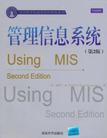管理信息系统
出版时间:2010-10 出版社:戴维·M·克伦克(David M.Kroenke) 清华大学出版社 (2010-10出版) 作者:戴维·M·克伦克 页数:506
前言
在我国高校,用英语或双语教授专业课程(以下简称:英/双语教学)始于改革开放引进热潮,历经30年,虽发展不快,仍在缓慢推进。20世纪80年代,改革开放后留学归来的教育界学者们不仅引进了各学科先进的研究成果,也随之引进了西方高校的教材。以清华大学出版社为领军的国内出版社适时地引进了西方优秀教材的影印版,推动了一些高校开始在专业课程中开展英/双语教学。2007年以来,国家教育质量工程专设的“国家高校双语教学示范课程建设点”的评定项目被视为政府教育发展的政策风向标,正有力地推动着高校英/双语教学的发展。但对英/双语教学的必要性,我国高校内部一直争议不断。争议首先围绕着中国人用英语教学的必要性。在公认英语是目前世界通用语言的前提下,英/双语教学的必要性取决于我国高校师生是否有必要及时汲取世界最新的知识和研究成果。答案是不言而喻的。况且英/双语教学省却了翻译过程,可以避免常见的信息减损和曲解问题。不过,信息发布者——教师的英语演讲能力和信息接收者——学生的英语解读能力不足又成为开展英/双语教学的障碍。因而常见的反对意见是,开展英/双语教学,课堂教学内容就会缩水,因为讲授者和听众都得花费精力和时间解译内容。如此看来,我国开展英/双语教学的高校教师必须应对挑战,洞察在我国现有条件下用英文原版教材开展英/双语教学的利和弊,并找到可行的扬长避短的路径。在经济开放和全球化的大趋势推动下,我国中小学英语教学分量加重,英语普及程度逐年提高,高校新生的英语基础愈益扎实;教师的英语能力也随着师资的新陈代谢而日见增强。这一趋势无疑在为英/双语教学营造越来越有利的条件。尽管如此,不同于以英语为主要语言或官方语言的一些国家,英语在我国的普及率仍较低。在青少年中,英语的普及程度和英语应用能力还仅处于初级水平;高校中能用英语演讲的教9币尚属少数,且熟练程度还有待大幅提高。这样的师生英语基础,使得英/双语教学面临巨大的挑战。同时,在多数的中国高校课堂里,教学任务多被视为逐章讲解某本教材的内容。本土中文教材通常是400~500页的32开本,含理论框架、主要知识点、计算方法和习题,但案例和故事不在其中,多由教师在讲解时添加,以演示和诠释理论要点。迄今仍然普遍盛行的“填鸭式”、“满堂灌”的传统教学法侧重于传授知识,从多数评教指标可见,只要学生感觉教师讲得精彩、有条理、能解惑,就算教学成功。
内容概要
《管理信息系统-第2版》详细阐述了信息技术、信息系统和管理信息系统所涉及的内容,如硬件与软件、数据库处理、通信与互联网技术、电子商务、系统管理与安全等。全书结构清晰、论述透彻、通俗易懂。可作为经济管理类专业学生的教材,也可作为中高层管理人员提高自身知识素养的参考读物。
作者简介
作者:(美国)戴维·M·克伦克(David M.Kroenke)戴维·M.克伦克(David M.Kroenke)曾在美国科罗拉多州立大学和西雅图大学任教,目前为华盛顿大学教授。曾为美国空军与波音公司计算机服务部工作,并为IBM,微软等公司提供咨询服务。他领导着数十个由信息系统与技术领域的教授组成的研究机构。1991年,信息系统国际协会授予他年度计算机教育家称号。出版了《数据库原理》和《体验管理信息系统》等教材。
书籍目录
第1部分 管理信息系统介绍 第1章 你和管理信息系统 第2章 利用信息系统产生协同 第3章 利用信息系统获得竞争优势 第2部分 信息技术 第4章 硬件与软件 第5章 数据库处理 第6章 数据通信 第6a章 互联网运作原理 第3部分 信息系统。 第7章 组织内部的信息系统 第8章 电子商务与供应链系统第9章 商务智能系统 第4部分 管理信息系统资源 第10章 系统开发 第11章 信息系统管理 第12章 信息安全管理
章节摘录
插图:The best way to enjoy this class is to think seriously about it. IT and 15 are mcrecllDlyimportant in business today. It will be worth your while to form your own opinionsabout what you read and to confront the opinions of others. The Opposing ForcesGuides (another category of guides, that you will find in later chapters) and theProblem-Solving Guides will help you do that. In addition, many chapters concludewith an editorial, called a Reflections Guide, in which I express my personal ideasabout material in the chapter. You may or may not agree with these ideas, but theactivity of critically reading and considering them will help you marshall yourthoughts and opinions about the chapter material.Beyond such critical reading and thinking, the key to enjoying the class is to applywhat you are learning to situations and organizations of interest to you. For example,think about the information systems around you. Consider your university's classenrollment system and ask as many questions as you can think of: What hardware,software, data, procedures, and people are involved? Who are the users? What proce-dures do they follow? How are those people trained? How do you suppose your classenrollment system was developed?Was it constructed just for your university?Was thesoftware written in-house by university employees or was it purchased from vendors?Do other universities use this same system?What information does the university gain from this system? Of course, thesystem schedules classes, but what other information does it produce? How couldthe university use that information in innovative ways? What can the university learnabout trends in education? About trends in student goals and objectives?what infor-mation can it extract from this system to facilitate planning and budgeting?Every day you touch dozens of information systems. Begin to ask yourself aboutthe nature of those systems and how they impact you. What, besides the obvious, dothey do? At the grocery store, is the information system that interprets the UPC codes on the items that you buy connected to the information system that processes your Credit card? If so, could the credit card company refuse to allow you to buy certain items?Would they?Would it be legal if they did?Who owns the data about your grocery store purchases? What keeps the credit card company from selling the fact that you buy lots of ice cream to the Association of Dairy Farmers of America? Could your insurance company raise the premium on your health insurance because you buy lots of calorie-laden foods?Less controversial, consider the information systems you encounter in the context of your major field of study. For example, if you are studying marketing, how could the marketing department of the grocery store use the purchase data to plan sales? Or how can management use the effectiveness of sales promotions? How can the grocery store use its information systems to control theft?As you proceed through this class, learn to be curious about the information sys- tems around you. Ask the employees of stores and restaurants what they think about the systems they use. How long have they had their information system? What did they do before it? How well do they like it? The more you apply the knowledge you gain in this class to your life, the more interesting it will be, and the more you will enjoy this class.
编辑推荐
《管理信息系统(第2版)》:美国商学院原版教材精选系列。
图书封面
评论、评分、阅读与下载
用户评论 (总计1条)
- 是正版,而且价格还可以,速度也很快。。。
